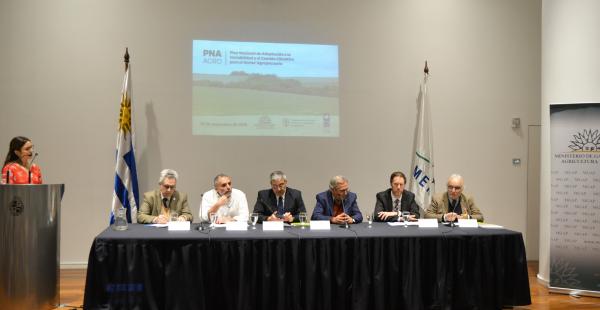
Uruguay launches National Adaptation Plan for the agricultural sector
To cope with the impacts of climate change faced by the agriculture sector, Uruguay developed a new plan for climate action that was launched on 18 September 2019.
The Uruguayan National Adaptation Plan to Climate Variability and Change for the Agricultural Sector (also known as PNA-Agro, in Spanish) is a strategic instrument that will help the country to achieve the national adaptation and mitigation commitments established in their first Nationally Determined Contribution (NDC), as well as contribute to the Sustainable Development Goals (SDGs).
The PNA-Agro proposes a strategy for 2050 and an action plan for 2025, with adaptation measures in four dimensions: production systems, ecosystems and natural resources, livelihoods and institutional capacities. It aims to increase the adaptive capacity, build resilience and improve the livelihoods of rural populations through the adoption of sustainable animal and plant production systems, development and transfer of technology, information systems, climate insurance, resilient infrastructure, promotion of best practices, support of networks and organizations of farmers, and strengthening of institutional capacities for adaptation.
The PNA-Agro is the consolidation of a three-year participatory process, which aimed to identify, order and prioritize climate actions. In 2017, a consultation process was carried out through a series of Adaptation Dialogues, in which more than 200 people from the private, public, academia and civil society sectors participated. These dialogues identified the main impacts of climate change as well as priority adaptation strategies focusing on different productive systems, rural women and family farming. In addition, a series of workshops on adaptation were organized in agricultural high schools across the country, in which nearly 450 young people participated. In July 2019, the content of the PNA-Agro was discussed and validated in a meeting with actors from public agricultural institutions, subnational governments, civil society, farmer organizations and academia.
The process was led by the Unit of Sustainability and Climate Change within the Office of Agricultural Programming and Policy (OPYPA) of the Ministry of Livestock, Agriculture and Fisheries (MGAP), in coordination with the National System of Response to Climate Change and Variability (SNRCC). The United Nations Development Programme (UNDP) and the Food and Agriculture Organization provided technical support under the Integrating Agriculture into National Adaptation Plans (NAP-Ag) Program funded by the German BMU through the International Climate Initiative (IKI).
In Uruguay, the prioritization of climate change adaptation in the agricultural sector did not begin with the PNA-Agro. The formulation of the PNA-Agro was carried out on the basis of more than a decade of national studies and research that contribute to better decision-making regarding adaptation actions, such as “Clima de cambios. Nuevos desafíos de adaptación en Uruguay”.
Moreover, a series of studies were carried out under the NAP-Ag Program with the purpose of generating relevant evidence for the NAP, such as:

